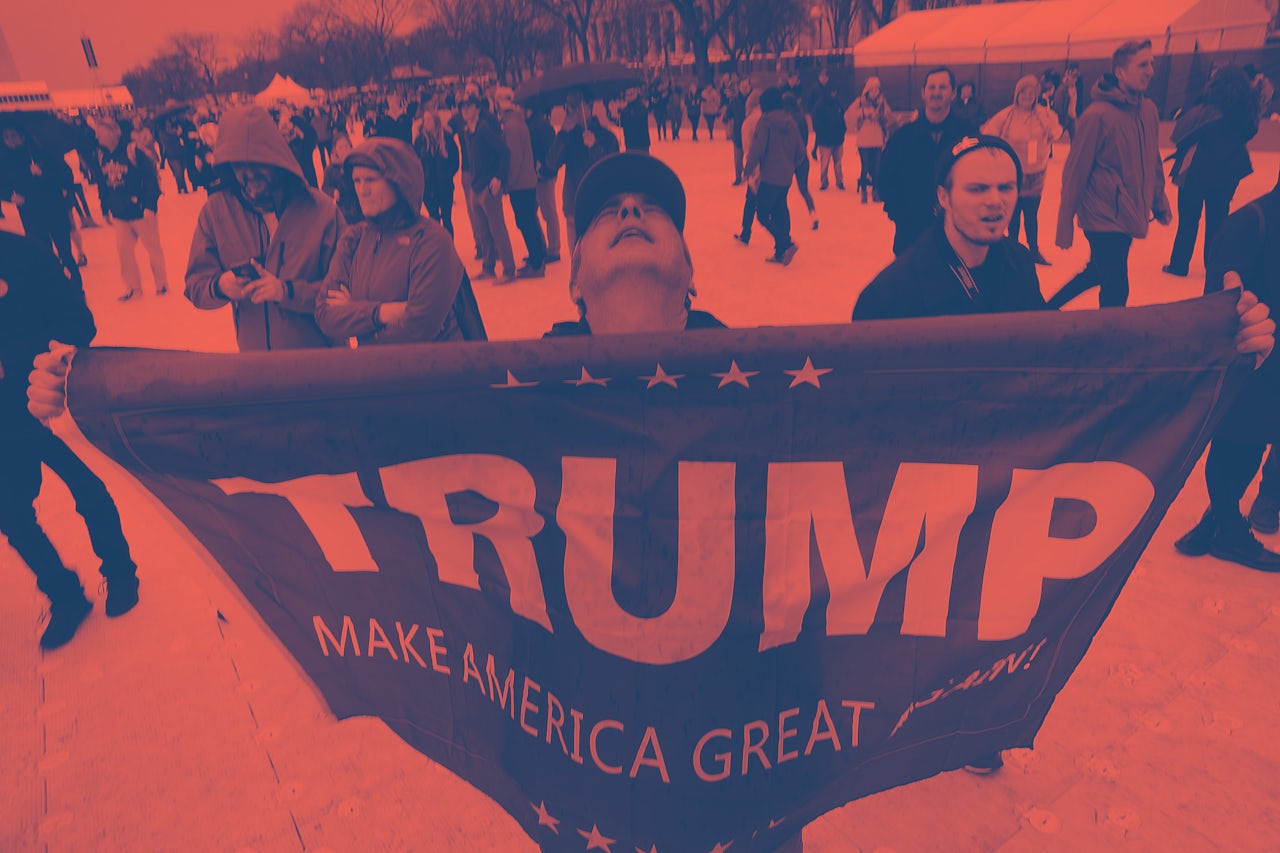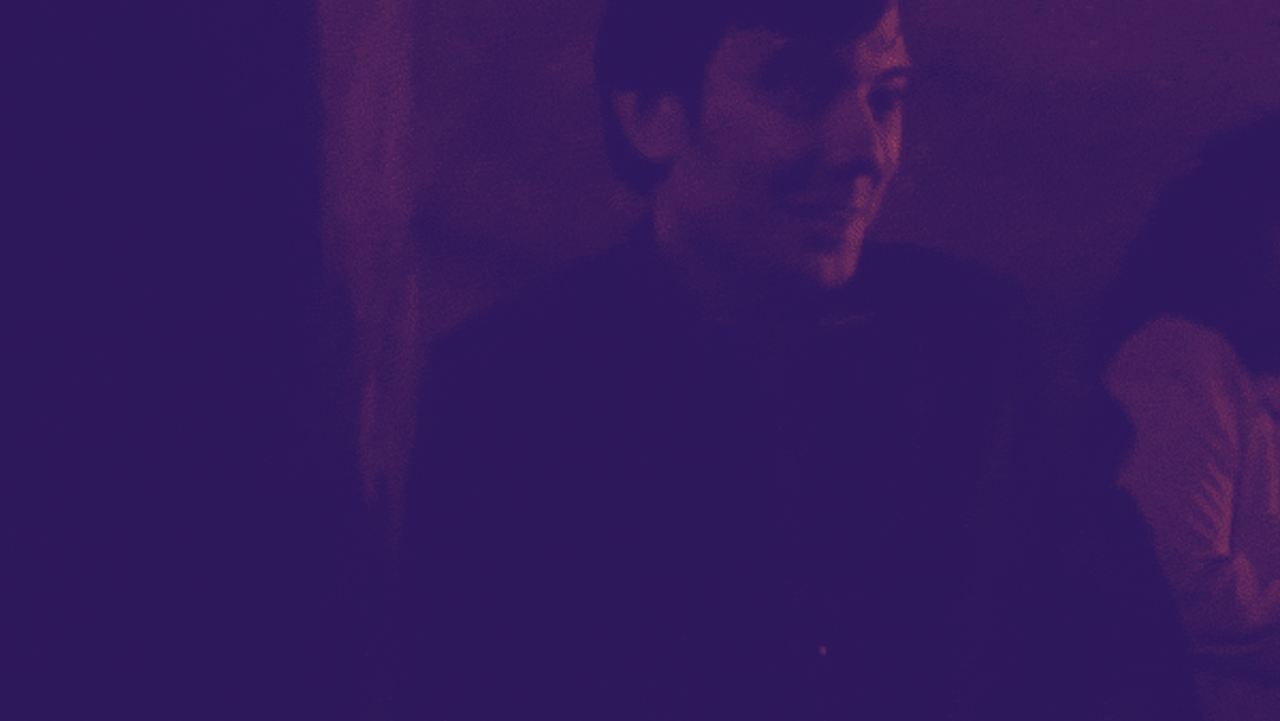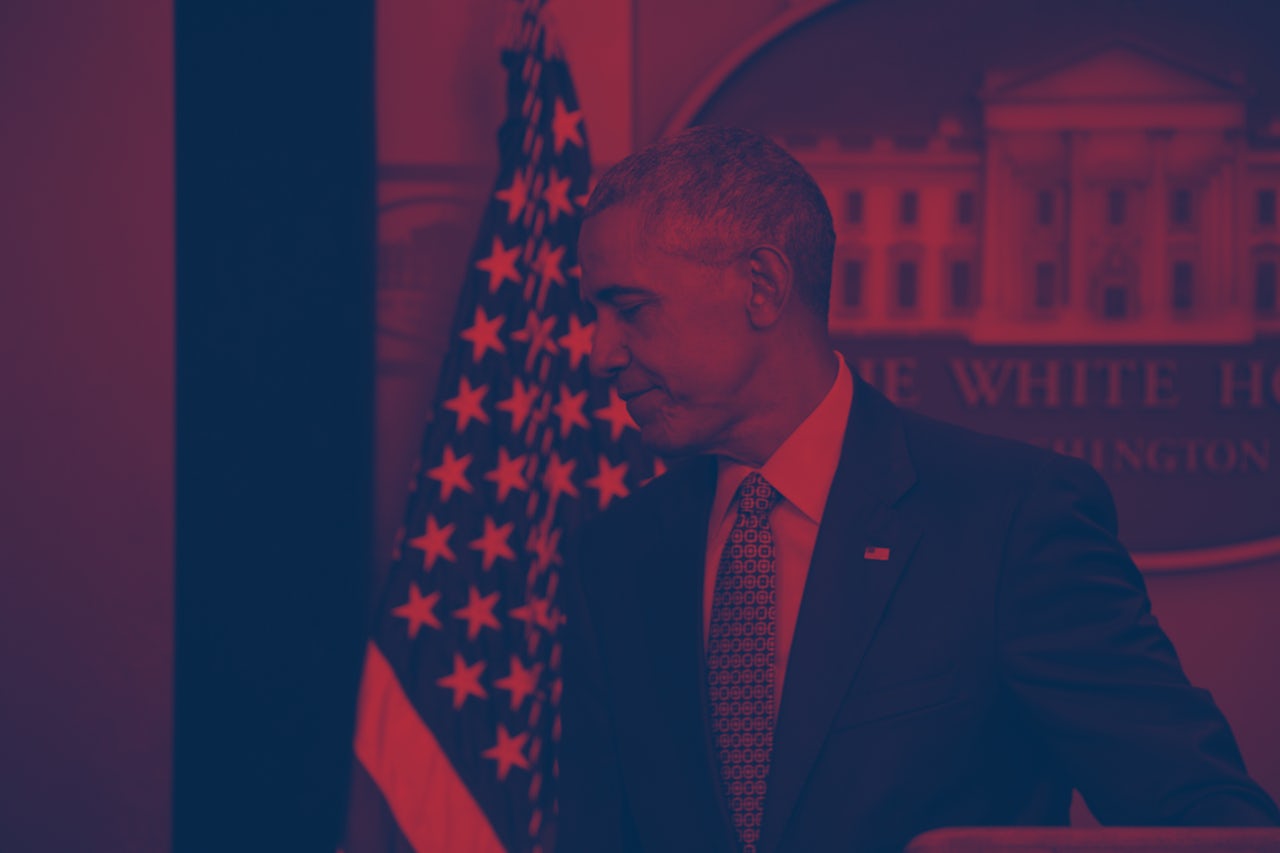The 58th presidential inauguration did not take place in Washington, DC; it happened on TV. Liberal critics have gleefully pointed to the relatively small number of attendees, as if this were Trump’s last hurdle rather than a screening for a show that has already won all the awards, as if it mattered — but on the ground, below all the aerial cameras, the streets were still packed, and there were thousands that didn’t make it through the militarized checkpoints in time to see it happen. I was one of them. As Donald Trump gave his first speech as the most powerful man on Earth, a few hundred short meters away on the steps of the Capitol, I waited patiently on a 7th Street filled from curb to curb with his supporters. An indistinct voice boomed over the city, its sounds mushed together into a whine and honk that was still immediately recognizable: a pure Trump speech, no words or meaning necessary. And everywhere around me, uncountable Trumps stared hangdog from phone screens, live-streaming what was happening just around the corner, relayed through cameras and TV stations and satellites tracking through outer space.
The people in that hushed crowd around me weren’t the neo-Nazi alt-right, the pyogenic meme kids who’ve deluded themselves into thinking that pictures of frogs won an election. They were the most generous people you’ll ever meet, true corn-fed Real Americans. New Jersey moms, blue-eyed and gregarious, hoisting giant Trump flags. Mildly terrifying Republican teens, with pale and flawless skin that might have been rendered in a CGI studio, wearing suits slightly too big for them and the only baseball cap they’ve ever owned. The bikers for Trump, patches on their jackets simultaneously proclaiming their Christian mission and their willingness to kill any living thing that the US Armed Forces wanted dead, people who have perfected that mode of joking around without ever actually being funny.
Locals, or a few of them at least, were busy selling merchandise. Trump flags, Trump placards, Trump hats, Trump T-shirts, Trump towels — but especially badges. The slogans ranged from the pithy (“God, guns, and Trump”) to the breathless (“I’d rather be deplorable than despicable like Hillary”) to the flat-out mystifying (“Feel the wall” — why?) — but the most common feature were the Minions, DreamWorks’s copyrighted and adorable little Cyclops-nubs, gawping and fawning underneath the glib slogans of victory. The vendors were almost uniformly black, and very enthusiastic. “Don’t be a Democrat, get yourself a Trump hat!” Later, we asked one of them what he actually thought of the 45th president. He gave a strained look, glanced around him for any listeners, and shrugged. “I don’t really like him.” Some stalls were selling all the Trump gear alongside liberal merchandise for the protesters — I’m still with her, yes we did — as if they were just rival clothing lines being sold in the same department store. Capitalism consumes everything, it chomps up the world in all its differences, and shits out nothing but itself.
Speakers at the inauguration endlessly referred to the Founders, the great American heroes who set the wheels spinning that would eventually churn out a President Trump. What these men really were, of course, is cosplayers: English half-barbarian settlers, play-acting at being Republican Rome. We all know how that experiment ended. The republic lasted for some 500 years of internal bloodshed and external genocide before it fell; its farcical re-enactment across the Atlantic probably didn’t endure so long. Trump’s awfulness hardly disqualifies him from a position that’s been held by sadists and génocidaires since it was created. He certainly isn’t the first emperor — Nixon might be the American Caesar, and Reagan its Octavian — but in the Donald, the United States finally has its Caligula, a spiteful momma’s boy to cover everything in gleaming marble and torture the worthies to death.
Then, after the inauguration, the parade. Again, there was no worse place to see it than where it was actually happening. For what felt like hours I stood in the thin and grumbling crowds outside the FBI building, watching a low pool of police sirens ripple like a mirage under the dome of the Capitol. When it finally arrived, an announcer would stuffily invite us to clap politely for each dignitary or marching outfit as they arrived. A group of soldiers in preposterous Revolutionary War getup, powdered wigs and tricorn hats and muskets, spoiling any pretence that the solemnity and dignity of US government pomp is at all distinguishable from a witless historical re-enactment society. A bus, marked “The Pride of Metrobus.” What looked from a distance like military vehicles — maybe ICBM launchers, maybe they’d drive to the White House and then immediately target Beijing — turned out to be flatbed trucks carrying TV cameramen. “Fake news!” the crowd shouted, without much enthusiasm. And then the president, achingly slow in his official car surrounded by Secret Service agents. A pale, pudgy hand was briefly visible against the window; it waved, did a thumbs-up, and then retreated again.
I’d expected it all to be a dismal circus, the carnival at the end of the world, something utterly bizarre, but really it was no more stupid than anything else in American politics. The farty parp of the brass bands, the farty pomposity of the bureaucrats and clerics, it was all just as ridiculous as Trump himself, and in the end he slotted into all the ceremony with a lubricated ease. You expect the world to stop turning, and instead he put his hand on the Bible and said the words, and then there fell a light shower of rain.
I’d expected it all to be a dismal circus, the carnival at the end of the world, but really it was no more stupid than anything else in American politics.
It didn’t feel like fascism had suddenly, calamitously arrived in America; something far stranger was taking place. Trump’s building his wall now — but along long stretches of the border there’s already a wall, crenellated with guns and surveillance tech, decorated with crosses to mark the people who died trying to make it over. I’ve crossed that border myself; I’ve seen how America looks from the outside, a blank and faceless cyborg nation; the big and beautiful wall is just another way of saying there will be more crosses on a border that already exists. Trump has started imposing his ban on Muslims entering the United States and is being met with intense and heroic resistance — but that list of seven nations whose citizens are barred was first compiled by the Obama administration. All of these countries, bar Iran, are being bombed by the American military, and in the case of Syria and Libya, it was Obama who started bombing.
On the DC metro — gloomy underlit caverns that might have been based on a doodle by Mussolini — every other poster invites you to watch The Man in the High Castle, Amazon’s increasingly loose adaptation of the great Philip K. Dick novel. You see the Statue of Liberty, draped in a red, white, and black flag, one arm raised in a Nazi salute. Imagine, the posters said, if things had gone differently, and America had ended up under fascist rule. Imagine if in the United States, people were brutalized and killed simply because of the color of their skin; imagine if a cruel and indifferent military machine had seized control of the entire planet. What a strange and foreign world that would be.
In Dick’s book, our characters live in a 1962 split between the Greater German Reich and the Empire of Japan — but as they slowly come to realize, this world is wrong; the Nazis really did lose the war, and they’re trapped in a false reality. But crucially, the real world isn’t the one we live in either. We ourselves are living in a dystopian novel. Well, aren’t we?
The Trump inauguration was not meant to happen. He was the joke candidate, a stupid gimmick, a flimsy piece of entertainment drivel. A Trump presidency was a punchline on The Simpsons 17 years ago; it was prefigured in 1989’s Back to the Future Part II; it was always a warning, a piece of grim satire too on-the-nose to ever actually happen. From the moment he announced his candidacy until a few hours after the polls closed, the idea that he might actually win was always taken as an essentially unserious one, a kind of counterfactual speculation. Hillary Clinton would win; she was an inevitability. This was the whole thrust of the Democratic campaign — less a politician offering some vision of a future she could build, more someone filing a job application. Please consider me for the presidency of the United States, because I’m ever so qualified, and it’s all I’ve ever wanted. In the end, voters rejected her pitch in favor of a person who famously, like them, takes great pleasure in turning smugly overqualified job applicants down.
For so many liberals, this was unacceptable: His victory is illegitimate, not because of the monstrous things he’s said and done, or because of the Russian hacking conspiracy theory, or even because of his loss in the popular vote, but simply because it was the wrong thing to have happened. If Trump wins in a world where Hillary was always supposed to have won instead, then that world is not the right one. We’ve ended up in a fake universe. The task isn’t to struggle against its evils, but to slip back into whatever wormhole we fell through and get back home.
But some were still struggling. While Trump’s car was oozing gently along the parade route, elsewhere in the city cars were on fire. In a few weeks, not many people will really remember the street violence that accompanied Donald Trump’s inauguration. It might already be forgotten now. But for roughly two and a half hours, it was all anyone was talking about: “communists” and “anarchists” running riot over the city; tear gas and stun grenades; broken windows, burning vehicles, sheer lawlessness. I saw the devastation myself. A few trash cans had been knocked over. Their contents were scattered over the street, behind a line of riot cops protecting the pile of soda bottles and paper plates as if it were the nation’s most precious treasure. Media figures who had for months announced themselves as the Resistance were suddenly furious: you can disagree with the election result all you want, but don’t you dare resort to rearranging anyone’s windowpane. Similarly, thousands of shocked liberals would later condemn the masked hero who punched neo-Nazi Richard Spencer in the face during a live interview. Actions like these, making the ascendant far-right look like a bunch of sniveling cowards while bringing leftists of all stripes together in celebration, were judged to be nebulously Bad for the Cause.
It’s true, though: Smashing windows or punching Nazis might be cathartic, but it doesn’t really do anything. A few days later, the windows are back in place, and the Nazis are back on TV. It’s a strange standard, though, asking a few ordinary activists to overthrow the most powerful man on the planet on the day of his coronation. People did what they could: Labor unionists and the movement for black lives blockaded some of the entrances to the inauguration, and others marched through the streets, trying to be as ungovernable as they could. As one of the protest organizers told me: “Can you imagine if there was nobody here to oppose this?”
What she also said, which surprised me, was that she would be attending the Women’s March the next day. I had expected to be cynical; I knew what was coming. The Hillary Clinton contingent in its plaintive multitudes, descending on the capital to announce nothing more substantive than its distress at having lost an election. And there was plenty in the march to be annoyed by, if you felt like being annoyed. The placards unable to make any political point without relating it to pop culture — “Help me, Eleven, I’m stuck in the upside-down,” “Dumbledore would never have allowed this” — or the toxic prevalence of the Russian hacking conspiracy theory. Signs calling him “comrade Trump,” signs emblazoned with mocking hammers and sickles. (It’s hard to imagine anything more dangerous for any resistance movement than the idea that the president should be fought not on the basis of the evils he will commit against ordinary people in America and abroad, but because of some bastardized spy-novel fantasy.) But I was wrong.
So many people had been trying to turn the Women’s March into what I’d dreaded. Newspapers and magazines ran endless stories about Facebook contention within the movement. Any tiny number of people upset online would be held up as symptoms of the fracture: white women who felt sidelined by black activists, men like Jonathan Chait miffed that it couldn’t be made all about them. Anything bearing any qualities whatsoever was proclaimed to be “divisive”; the actual suffering of any one person was meant to undermine the solidarity of the whole. This was the vision: a mute and indifferent mass, marching for no reason other than its ability to do so, undivided because it refused to say anything at all.
The reality was different. I stood in the vast middle of the largest protest in American history, and gawped. No matter how inchoate their politics or naïve their chants, half a million people came out into the worst city on the planet, not just to say “no” to the incoming evil, but to insist on an “and” — reproductive rights, LGBTQ liberation, the dignity of life, freedom for the imprisoned, socialism. If there’s hope, it’s in the “and,” an endless train of “and”s, a long, endless run-on sentence that keeps going, cycling through every permutation and particularity of a world that could be as rich and inventive as our language is, until we’re free.





